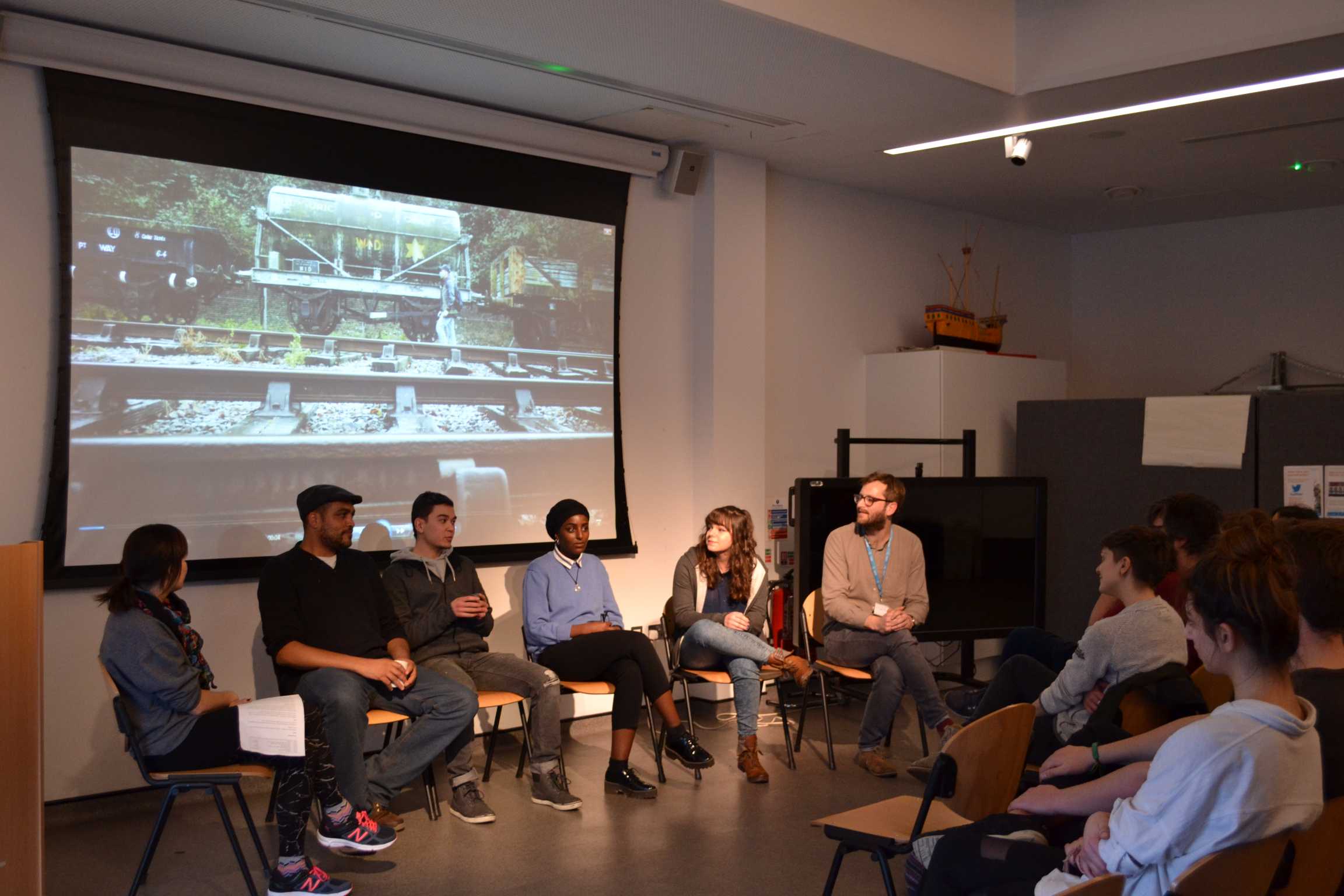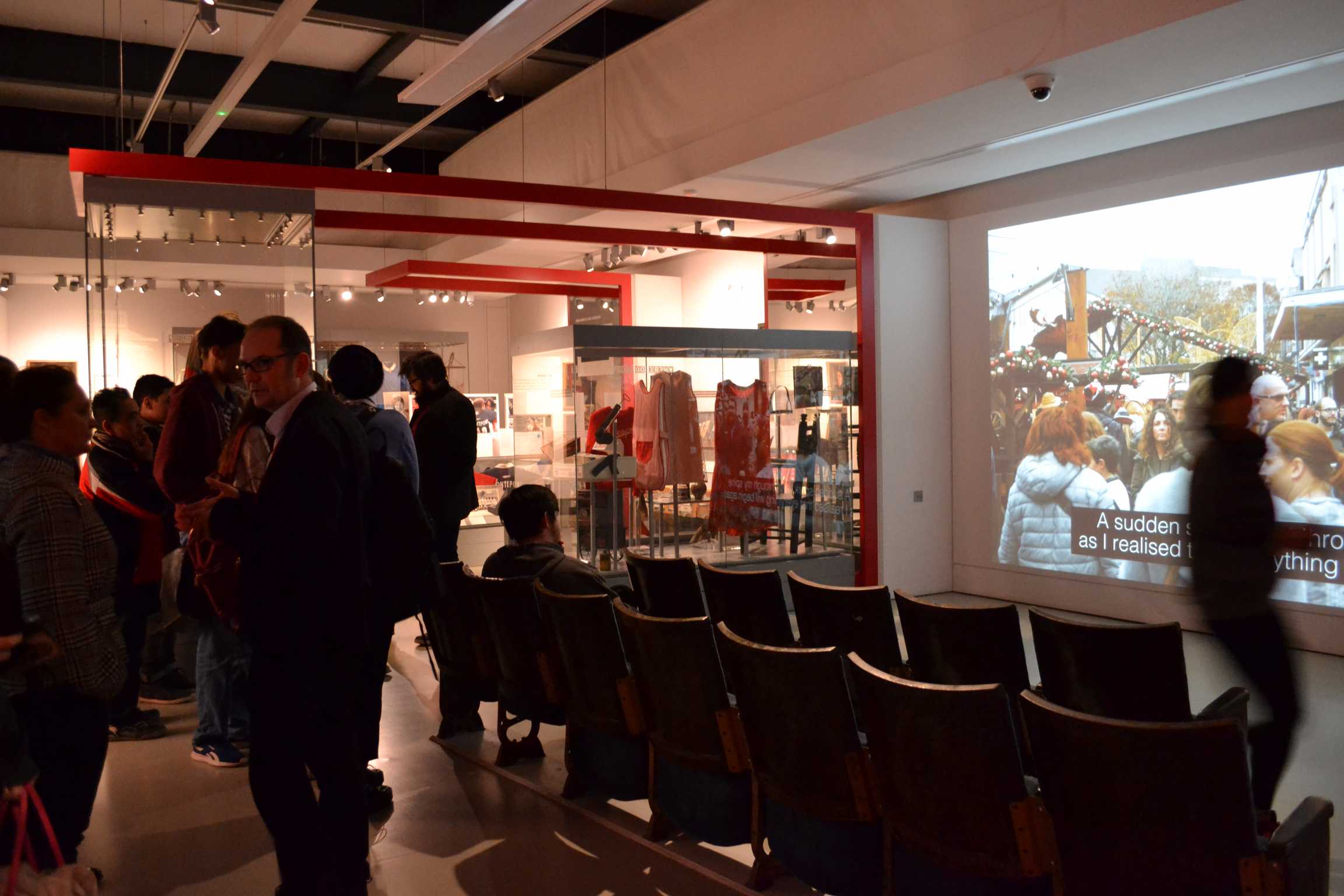A migrant’s view
Posted on by Fay Curtis.
by Hudi Charin, participation volunteer
Since March, M Shed’s Bristol Life Gallery has been screening two films dealing with young migrants’ experiences of moving to Bristol. In November, they will be screened again as part of our Celebration of Migration event. Here we revisit the premiere…
M Shed is a space in Bristol which celebrates the city’s complex heritage and diverse community. On 21 March, M Shed celebrated the premiere of two short films which engage with the experiences of young people migrating to Bristol, both of which then screened in M Shed’s Bristol Life Gallery.
 One film, Coming to Bristol, was produced by young English Speakers of Other Languages (ESOL) working with the museum and 8th Sense Media.
One film, Coming to Bristol, was produced by young English Speakers of Other Languages (ESOL) working with the museum and 8th Sense Media.
The second film, Chasing Borders, was coincidentally being made at the same time by students in the BFI Film Academy.
Both focused on the difficult topic of immigration, told from the point of view of young people. It is a sensitive issue but one which these films dealt with in a determined and thought-provoking way.
One of the young people involved was Polish-born Michał Zieliński-Loek who sat, camera on knee, eager to discuss the project. Sitting next to him was his father who, although unable to speak much English, was visibly proud to be part of the night. Michał acknowledged that in Poland everyone looks very ‘Polish’, yet in Bristol, the city is distinctly multicultural. It is a place of numerous identities and this is embraced in the Life Gallery.
At the back of M Shed, the gallery is ever-changing, adapting with the community in Bristol, incorporating the history of those who live here. A recent addition has been the stories of the Somali residents here, and these films will compliment this atmosphere of acceptance and education.

The ESOL film is artistic and poetic in its description of moving to Bristol. Patricia from the Philippines speaks of ‘petals of roses rushing down from me. Everything will begin again… It’s funny how a certain place can change your life.’ Double exposure editing allows flowers to blend with her face, creating a beautiful expression of immigration. It is an honest yet unusual way to talk of moving to another country.
Visitors to M Shed will surely feel the pride and privilege of living here. In the film, Romanian Roli stands still with crowds of people moving past him, representing the tranquillity he now feels in Bristol. He ‘noticed something different’ everywhere he looked, pointing out how he loves the parks here and how we look after our city. Elio from Italy says ‘I’m normal but I’m an immigrant. But I’m normal.’ Coming from teenagers, this is frank and refreshing.
The students of the BFI Academy have split their time between their film making and studies at various colleges across Bristol. The group of six are clearly passionate about telling stories through their work, with producer Asma Ibrahim saying that, through film, they want to provide a voice for people.
With Chasing Borders they focus on the story of a young immigrant named only as ‘Hamaad’. He tells us of how it took eight months to get to Bristol. During their journey there was a day when they only had a pot of Nutella to eat between the four members of his family. Now, he speaks of hope for the future, of a ‘new home’ where he now ‘feels safe’.

Although neither group of film-makers knew of the other’s project, the films work perfectly together, complimenting the different visual techniques used and amplifying the idea of the complex stories of Bristol’s young migrants.
After showing the films, the floor was opened for questions:
Why is this film particularly important in M Shed?
Michael Jenkins (film-maker who worked on Coming to Bristol): ‘We are bombarded by negative rhetoric about immigration and we need to see the human side. In a museum setting, it makes sense to learn and educate.’
Emilia Quistelli (director of Chasing Borders): ‘The museum is a great space for everyone. When immigration is such a current topic, it is important for everyone to see that a human being is a human being.’
Michał Zieliński-Loek: ‘We need to see both sides of the coin.’
Tell us about the process involved?
Asma: ‘It involved a lot of pre-production and a lot of research, then three days of filming and weeks of editing.’
Michal: ‘I learned a lot about other people, I didn’t expect that… Even I can subconsciously judge people.’
Michael: ‘It was eye opening to see what it’s like to be an immigrant all the time.’
Emilia [speaking of the immigrant in their film]: ‘There are many things he did I couldn’t do… we take this for granted.’
How do you feel about your film being a political statement?
Emilia: ‘Not everyone can like your film, that goes for all art forms.’
Michael: ‘As a film maker, I wouldn’t let the politics stop me from capturing people’s stories but the beauty of film is people can interpret it differently.’

Afterwards, we walked together to the Life Gallery, to see where the films would be played.
It was clear everyone was excited by the prospect of having these important stories shown in this museum setting. Visitors could move through M Shed and learn about Bristol’s heritage and history, finishing their trip by understanding this new piece of culture, and seeing the future of this diverse city.
To find out more about Bristolian experiences of immigration, come along to our Celebration of Migration event on 11 November 10am-4.30pm at Bristol Museum & Art Gallery.
You can watch these films here as well as browse stalls from different cultures and tour the museum’s collections to see how migration has influenced Bristol.